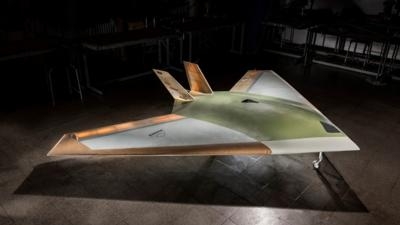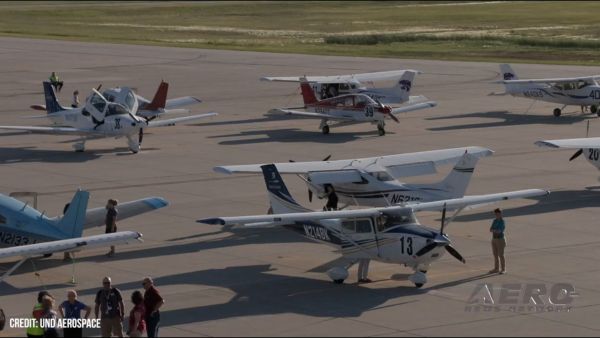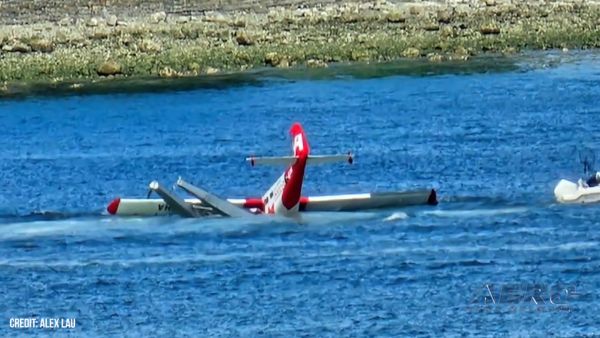Mon, Dec 18, 2017
BAE Systems And The University Of Manchester Seek To Change The Future Of Aircraft Design
BAE Systems and The University of Manchester have successfully completed the first phase of flight trials with MAGMA – a small scale unmanned aerial vehicle (UAV) which will use a unique blown-air system to maneuver the aircraft - perhaps leading to stealthier aircraft designs in the future.

The new concept for aircraft control removes the conventional need for complex, mechanical moving parts used to move flaps to control the aircraft during flight. This could give greater control as well as reduce weight and maintenance costs, allowing for lighter, stealthier, faster and more efficient military and civil aircraft in the future.
The two technologies to be trialled first using the jet-powered UAV, MAGMA, are:
Wing Circulation Control, which takes air from the aircraft engine and blows it supersonically through the trailing edge of the wing to provide control for the aircraft
Fluidic Thrust Vectoring, which uses blown air to deflect the exhaust, allowing for the direction of the aircraft to be changed.
The flight trials are part of an ongoing project between the two organizations and wider long-term collaboration between industry, academia and government to explore and develop innovative flight control technology. Further flight trials are planned for the coming months to demonstrate the novel flight control technologies with the ultimate aim of flying the aircraft without any moving control surfaces or fins. If successful, the tests will demonstrate the first ever use of such circulation control in flight on a gas turbine aircraft and from a single engine.
"The technologies we are developing with The University of Manchester will make it possible to design cheaper, higher performance, next generation aircraft," said Clyde Warsop, Engineering Fellow at BAE Systems. "Our investment in research and development drives continued technological improvements in our advanced military aircraft, helping to ensure UK aerospace remains at the forefront of the industry and that we retain the right skills to design and build the aircraft of the future.”
"These trials are an important step forward in our efforts to explore adaptable airframes," said Bill Crowther, a senior academic and leader of the MAGMA project at The University of Manchester. "What we are seeking to do through this programme is truly ground-breaking.”
Additional technologies to improve the performance of the UAV are being explored in collaboration with the University of Arizona and NATO Science and Technology Organization.
(Image provided with BAE news release)
More News
An Amazing Experience Awaits The Chosen Few... Oshkosh, to us, seems the perfect place to get started on watching aviation recover the past couple of years... and so ANN is putting>[...]
“NBAA has a tremendous responsibility to the business aviation industry, and we are constantly collaborating with them. Our flight departments, professionals and aircraft own>[...]
Dead Reckoning Dead reckoning, as applied to flying, is the navigation of an airplane solely by means of computations based on airspeed, course, heading, wind direction, and speed,>[...]
Aero Linx: Vertical Aviation Safety Team (VAST) We are a public–private initiative to enhance worldwide flight operations safety in all segments of the vertical flight indust>[...]
We're Everywhere... Thanks To You! Even with the vast resources and incredibly far-reaching scope of the Aero-News Network, every now and then a story that should be reported on sl>[...]
 ANNouncement: Now Accepting Applications For Oshkosh 2024 Stringers!!!
ANNouncement: Now Accepting Applications For Oshkosh 2024 Stringers!!! Aero-News: Quote of the Day (06.13.24)
Aero-News: Quote of the Day (06.13.24) ANN's Daily Aero-Term (06.13.24): Dead Reckoning
ANN's Daily Aero-Term (06.13.24): Dead Reckoning ANN's Daily Aero-Linx (06.13.24)
ANN's Daily Aero-Linx (06.13.24) ANN FAQ: How Do I Become A News Spy?
ANN FAQ: How Do I Become A News Spy?



